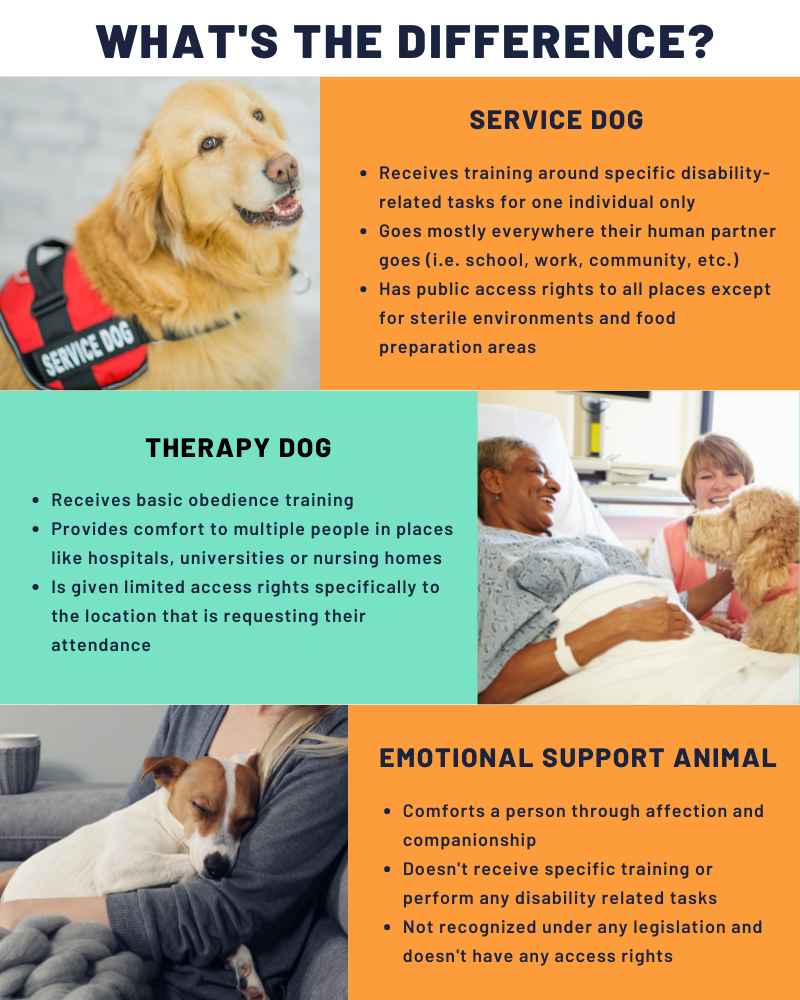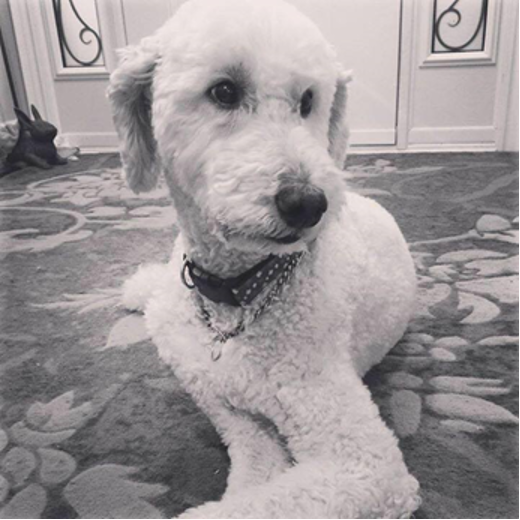My Journey With Barkley by Devon MacPherson-Mayor
How My Service Dog Changed My Life
Devon smiles besides Barkley, a fluffy white Poodle type dog.
“What does she need a service dog for?”
Devon and Barkley at Graduation in 2015
As I walk across the graduation stage with my service dog Barkley (who I might also add is wearing the same matching gown and cap as myself), applause fills the air. Over the years I spent at university, it wasn’t uncommon for people to know Barkley’s name and forget my own. This never bothered me though, as I took it as a sign that people were not only noticing him but considered him a part of campus just like everyone else.
However, later as I was driving home from the graduation with my parents, they mentioned to me that someone behind them in the ceremony had remarked, “What does she need a service dog for? She can see.” As they made the comment, I could imagine that they would have never thought, amongst the hundreds of people in this crowded hall, that my parents would be standing right in front of them. My parents, much like myself, never took offence, as it wasn’t an uncommon question or statement to be directed my way over our years of partnership. Even today, some people still aren’t aware of the wide variety of reasons a person might be partnered with a service dog, for example, autism assistance, diabetic alert, guide, hearing, mobility assistance, psychiatric service, seizure alert, severe allergy alert, and wheelchair assistance.
A New Friend
I was first partnered with Barkley back in 2011, after a tumultuous few years of struggling with OCD, depression and anxiety, which had completely flipped my life upside down. Along with spending time as an inpatient in a hospital, I also had to take a year off school (something completely devastating to me as one always dedicated to academics). It was difficult for me to keep friends and most distressing; I was having troubling thoughts in my head that had me questioning everything I knew about myself. My concentration was so poor at the time that it was hard for me, even as an avid reader, to pick up a book or watch TV. I had gone from a very high-achieving and involved person to someone that could barely make it through the day.
Types of service dogs: Autism assistance dogs, diabetic alert dogs, guide dogs, hearing dogs, mobility assistance dogs, psychiatric service dogs, seizure alert dogs, severe allergy alert dogs, wheelchair assistance dogs.
After a couple of years of working collaboratively with a doctor, who was able to find the right combination of medications for me, as well as receiving therapy, learning new coping strategies (something I embarked on with the same high-achieving nature I approached school) and being lucky enough to have the unwavering support of my family, I was starting to feel like myself again. I would argue a better version of myself as I now had embedded coping strategies and a new way of looking at the world. But I still felt like something was missing.
Having been an active horseback rider throughout my childhood and teenage years, as well as a lifelong lover of animals, I became interested in service dogs. After learning about the role that service dogs could play in the lives of those struggling with mental illness, I thought that this could perhaps be the missing part of my recovery puzzle. Unfortunately, in Canada, since there is not a non-profit organization that partners service dogs with those who have a mental illness (unless you’re a veteran), I had to pay out of pocket for Barkley. Knowing that this is something that not everyone has access to financially, I was and still am incredibly grateful for his partnership.
So what’s the difference between Emotional Support/Therapy Dogs and Service Dogs?
Service dogs are different from Emotional Support Animals and Therapy Dogs because they are trained in specific disability-related tasks to work with one individual person. Although therapy dogs and emotional support dogs provide comfort and companionship to many, they are not granted the same access rights as Service Dogs. Knowing the distinction between these types of working dogs is essential, in order to continue to properly advance the rights and privileges for humans partnered with Service Dogs. It is also essential that people do not try to pass their ‘pet’ dog as a Service Dog. Even though you think you might not be doing any harm, it makes it very difficult for the certified Service Dogs who follow you.
The First Time Barkley and Devon Met in 2011. Devon crouches on the ground next to Barkley, holding him and smiling.
As a personal experience, in one instance I went into a store, where the Manager stated that I was not allowed in. When I explained, as I had many times before, that Barkley was a Service Dog, she told me that they had recently had a ‘Service Dog’ in their store that bit someone, so they were no longer allowing any dogs into their store. This is a very clear example of someone whose ‘pet’ dog was brought into the store, limiting my access to the store when I arrived later. Even though you may think that it’s “no big deal” or that “your dog is very well-trained anyways”, it severely hinders the progress that Service Dog teams have worked so hard to make. Additionally, if you see a Service Dog out in public, it’s important to not distract them from their work in any way, as it could lead to dangerous consequences for the team and takes the Service Dog’s focus off their human partner. Barkley was once fed a piece of a submarine sandwich while he was working, which as you can imagine is a big no-no and also could have left him sick if he was allergic to any of the ingredients.
What’s the difference between a service dog, therapy dog, or emotional support animal? Service dogs are for specific disability-related tasks, therapy dogs provide comfort, and emotional support animals don’t receive specific training.
During our year of training together, Barkley was specifically tasked with learning how to provide deep pressure therapy, tactile grounding, alert in instances where my anxiety was rising and provided me with a constant in the sense that I knew no matter where I went, Barkley would be by my side. I was so excited when I was able to bring him home in January of 2012.
Although Barkley is now living his well-earned retirement, during his ten years of service (the average working time of most service dogs), he saw me through an array of experiences including my undergraduate and master’s degrees, dating, travel, various jobs, and everything in between. In fact, he was even at my wedding!
As I think back to the applause that erupted as Barkley and I walked across the graduation stage in 2015, I can’t help but think of it as a testament to the number of people he has crossed paths with (many who have their own personal stories of their interactions with Barkley). One thing I know for sure is that I’m so glad his path crossed mine.
About the Author
Devon holds a Master of Arts in Critical Disability Studies and spent many years of her education and beyond studying the role of service dogs for those with mental illness and the ethical implications of service dog work, which was recently published in the Canadian Journal of Disability Studies. Along with being an avid service dog and mental health advocate, Devon is now a Communications Coordinator with the Canadian Mental Health Association. In her spare time, Devon can often be found sipping tea and reading a good book. To learn more about Devon visit www.devonmayor.com.
About Barkley
Barkley is a Standard Poodle who is currently eleven years old. Although Barkley is now retired, he held the role of Devon’s service dog for ten years. Barkley enjoys spending time on the couch with his humans, treats and going for long walks.
Explore Possible
This blog post is part of Explore Possible, an initiative by Manitoba Possible to amplify stories, perspectives about disability, accessibility, and inclusion.
Read more at manitobapossible.ca/explore-possible or continue on to our latest posts by clicking the titles and arrows in the bottom corners!









